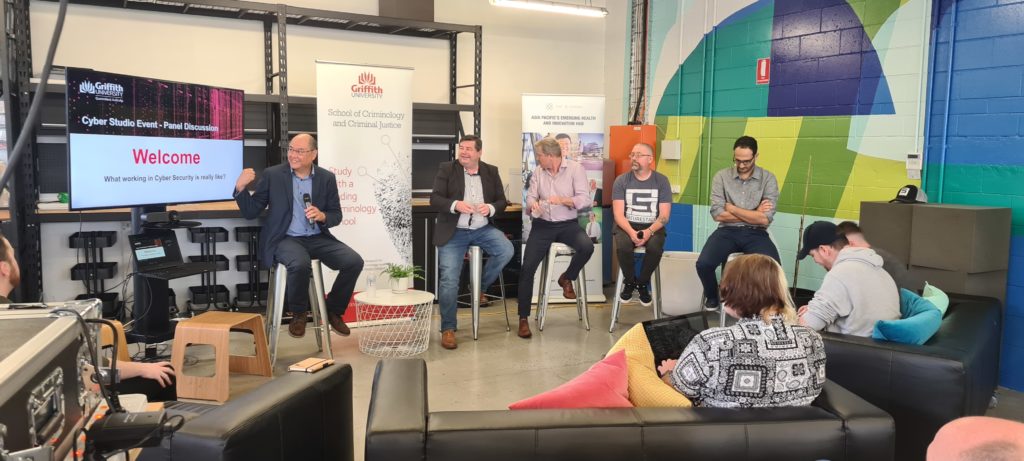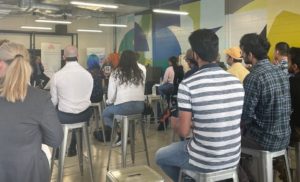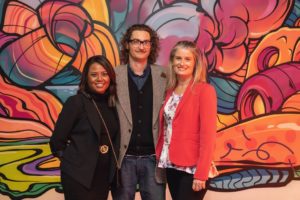
As students prepare to start the second university trimester for 2022, a culture of internships within Precinct companies is building, as start-ups and scale-up companies see the benefits of testing out student talent for future employment and students realise the opportunities to be exposed to a broad range of projects on offer in smaller companies.
It’s been a busy first six months of 2022 and 23 student interns have played their part in supporting the growth of several Cohort Innovation Space companies.
Cybersecurity, data science and software development are all areas of strong industry growth and the appetite for up-and-coming talent is growing just as quickly.
Since being named in Forbes 2021 list of top cybersecurity start-ups, SecureStack, a cybersecurity company focused on helping app developers make their products more secure, has seen significant growth, including working with their customer AustCyber, the federal body in charge of cybersecurity policy in Australia, to help small businesses understand cybersecurity challenges. AustCyber’s use of the SecureStack platform has grown by more than 300% since they onboarded in 2021, while SecureStack has also partnered with AWS and GitHub to offer services on their native marketplaces, and linked with of the world’s largest cyber insurance companies to help their customers be more prepared for cyber attacks.
Student interns have helped meet business demand, according to SecureStack’s founder and CEO Paul McCarty.
“The main benefit of having interns is that we can help build out the specific skill set that we need, that is generally hard to find in market here, which is a software engineer with cybersecurity experience,” Paul says.
“The most important thing we look for in intern candidates is drive and hunger to learn. If we find that all the other stuff is easy, as you can train and educate them, but that yearning to learn is NOT something you can train in someone, they need to have it to begin with.”


Paul shared his advice in a panel discussion that attracted 45 Griffith University IT students across undergraduate and postgraduate programs, all keen to learn about the benefits of small company experience over a corporate placement in kick-starting their careers.
He was joined on the panel by fellow Cohort cybersecurity firm CyberAudit Team and other industry representatives, along with Professor Paulo de Souza, Head of Griffith’s IT School, who indicated student numbers across IT programs had jumped 130% above pre-Covid levels.
“We will opportunistically hire,” Paul MCarty says. “We use internships to recruit talent and we will make openings for the right people.”
“One of my former interns who is now working with us said it best: ‘I love working here because I get to be across all of the things that SecureStack does and I can find areas that need help and I can fill that gap and become an indispensable member of the team.’ I couldn’t have said it better!”
SecureStack took on five interns, including Faisal Imtiaz, who is set to graduate as a software engineer this year.

“When I was offered an internship at SecureStack, I liked and understood their business objective and they were working on two things that I liked the most; Security and Programming,” Faisal says.
Over and above the technical experience are the key real-world learnings – “I am learning how a tech-based company works and how multiple people collaborate on a single project. How communication and management is done in a development-focused environment.”

For Edify Medical, a health tech start-up and graduates of last year’s inaugural LuminaX Accelerator program, taking on students for group projects across two trimesters is key to their philosophy to drive local employment, rather than seek remote talent overseas.
Edify Medical is creating a medical education platform to support healthcare workers in different languages who don’t currently have equality of access to up-to-date medical training resources, with their EdifyMed app.
Creative Director and Chief Technology Officer Adrian Marshall says 12 Griffith students are collaborating across two key projects to assist their platform development.
“The students we are working with on the group projects have come up with some fantastic ideas and we look forward to seeing how they execute them,” Adrian says.
“We’re excited to work with the students and look forward to building a relationship with Griffith moving forward.”
Data-driven technology company Datarwe has actively supported interns at both undergraduate and PhD level – they profile some of their current and former interns (some who are now working for them) here.
Meanwhile, Cohort recently caught up with Griffith international student Tay Ninh from Vietnam to talk about how he landed an internship gig at one of Australia’s fastest-growing start-ups Desygner.
The Precinct Office has embedded a resource within Cohort to facilitate connections between companies and Griffith University students.